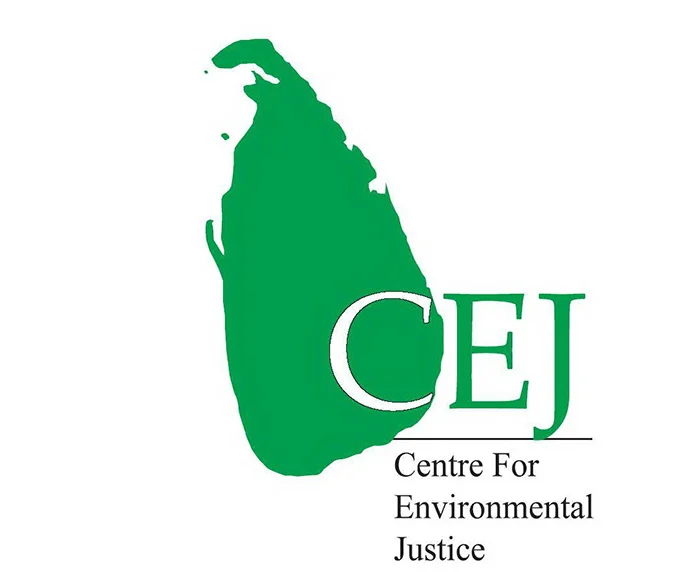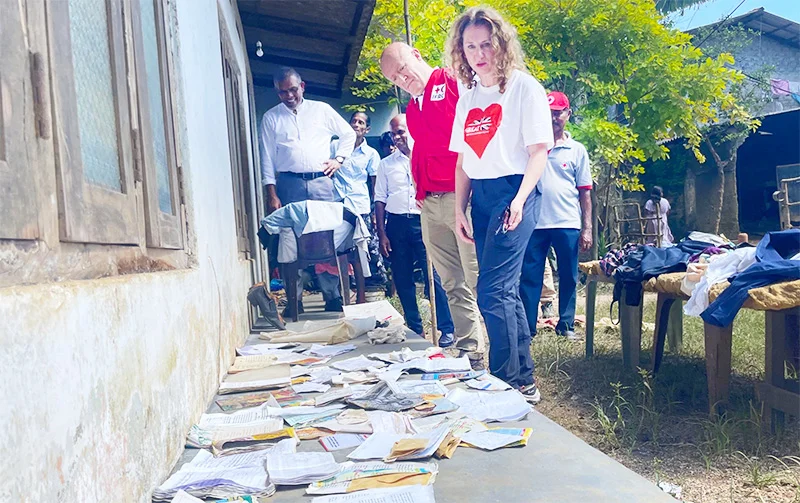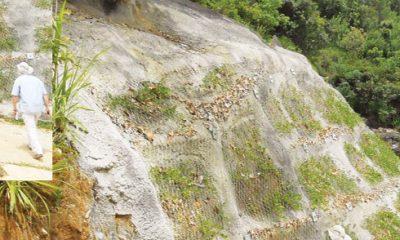News
Work with people to defeat Covid-19

by Jehan Perera
The sudden resurgence of the Covid pandemic in Sri Lanka was totally unexpected by the people at large though it was expected and predicted by those in the scientific and medical communities. The people had been reassured by the political leaders and sections of the media that Sri Lanka was a success story unlike other countries, including more developed ones that had been devastated by the pandemic. However, the country had received an early warning in the second wave which had commenced in October last year with the spread that was believed to have originated in the garment industry. But much before this the country’s top medical associations had been warning that community spread of the coronavirus had already commenced. These warnings were neither heard nor acted upon by the vast majority of the population. The mainstream view, until the shock of the third wave in April, was that Sri Lanka was a success in Covid management.
Sri Lanka enjoyed undoubted success in combatting the first wave of the coronavirus, with the participation of the security forces in implementing the lockdown and tracing of persons infected by the coronavirus. This success seems to have given rise to the misperception that the country was secure enough in terms of Covid control to give priority to the revival of the economy. But there was a big information gap between the appearance and the reality that swayed the governmental decision-makers. There can be no other explanation for their failure to heed the warnings that came from the medical and scientific community in the week, prior to the New Year shopping and holiday season.
Scholars, who have studied disasters that have afflicted human beings over the millennia, have noted that lack of proper information was often at the centre of those tragedies that might have been averted. Famines have taken place in many parts of the world and have led to millions of deaths that need not have happened. There was sufficient food stocks in other parts of the world, sometimes in the country itself, that could have been sent to the areas that did not have food. The Bengal famine of 1943 in British India is an example. The policy failures began with the provincial government’s denial that a famine existed. There was a breakdown in the lines of communication that could have led to food supplies from areas, where food stocks existed, being sent to the areas with short supply. (https://en.wikipedia.org/wiki/Bengal_famine_of_1943)
Since the successful containment of the first wave of Covid by the strict policy of lockdown and curfew adopted by the government, the restoration of the economy has been its first priority. The economy and people’s livelihoods received a severe battering during the two-month long lockdown. The Covid spread was contained but the economy shrank by more than it ever has in the post-independence period. The government gained the appreciation of the general population and the international community for its success in containing Covid. But the downturn in the economy needed to be restored which is what the business advisors of the government set out to do.
Unnecessarily risky
In retrospect,some of the government’s decisions, taken to revive the economy appear to have been unnecessarily risky in terms of containing the Covid spread. One was the partial reopening of tourism industry which led to an influx of tourists from countries that had poor track records of containing the pandemic, most notably Ukraine and India. These tourists were meant to arrive in a “bubble” and depart having toured the country in a “bubble” but even with these most stringent precautions it seems to have paved the way for new Covid variants to have taken root in the country. More recently there was media exposure given to a variety of “quarantine tourism” from badly affected countries from which the wealthier people wished to temporarily take a respite. The actions of government ministers in pouring “sacred water” into rivers to forestall the pandemic and their imbibing of a special “Covid herbal concoction” to protect against the virus was not based on science, professional advice and rationality that the country needs its decisionmakers to follow.
In these circumstances, it seems unfair that the blame for the resurgence of the Covid pandemic should be put on the people themselves who are charged with being negligent in their duties to take care of themselves and of others. Shock and awe treatment of ordinary citizens who were not taking the Covid pandemic seriously was witnessed on a video clip that were released of the police apprehending people who did not wear masks in commando-style. The videoing of the operations was done with precision and widely circulated on the media for maximum impact. The videos show police personnel in Covid protective clothing going into crowded urban areas, apprehending offenders who are not using masks properly, carrying them physically and bundling them inside parked buses to be taken to be charged. Such governmental actions can breed resentments that grow with the passage of time. The danger is also that the security forces may be induced to act similarly in other situations, too.
FRAUGHT TIMES
For the past year, after the success of the government in controlling the first wave of coronavirus, the people at large have been made to believe that the government has everything under control and that Sri Lanka has certain unique conditions that will spare it the fate of other countries. The recent police operations in different parts of the country to apprehend members of the general public who were either not wearing their face masks at all, or improperly by not covering their noses, suggests an intention to instill the importance of following health guidelines in the people. It would have been better if these police actions had been done consistently throughout the period, and by police in the course of their regular duties, such as during the Sinhala and Tamil New Year festivities in different parts of the country.
It needs to be kept in mind that these are very fraught times in which the majority of people are struggling to make ends meet. Due to the economic downturn many of them have lost their jobs or are getting only a part of their salaries. According to the World Bank, “With jobs lost and earnings reduced, especially in urban areas and among private sector employees and informal workers, the $3.20 poverty rate is projected to have increased from 9.2 percent in 2019 to 11.7 percent in 2020.” (https://www.worldbank.org/en/news/press-release/2021/04/09/sri-lankan-economy-recovers) Daily wage labourers find it harder to get daily work as potential employers do not wish to give them work and hire them for fear of Covid infection. Those who are fortunate enough to have their children attending schools with online teaching have all to meet extra expenses such as phone data charges for their children’s education.
At the same time as there is public resistance to a lockdown there is fear and apprehension about contracting Covid and the health consequences in a situation where the hospitals are full and not able to accept more patients. In these circumstances there can be pent up anger within society that can suddenly come to the fore. The government needs to take these tensions within people into account when it designs its responses to the unfolding crisis. Instead of demonstrating the punitive powers of the state machinery there could be an emphasis on messages of care from the government to the people. The government could take the people into its confidence and educate them about the true situation with regard to Covid spread and what can be done in partnership to mitigate it. It needs to come up with economic support schemes, such as the Rs 5000 dole or food coupons for the poor, that will make the people ready for a lockdown. A democratic polity will seek to inform, educate and work with the people to overcome any crisis the country faces.
Latest News
No change in death toll, stands at 639 as at 0600AM today [11th]

The Situation Report issued by the Disaster Management Center at 0600 AM today [11th December 2025] confirms that there has been no addition to the death toll in the past 24 hours and remains at 639. The number of missing persons has reduced by ten [10] and stands at 193.
There is a slight reduction in the number of persons who are at safety centers and, stands at 85,351 down from 86,040 yesterday. Five safety centers have also closed down in the past 24 hours and 873 safety centers are still being maintained.

News
Regulatory rollback tailored for “politically backed megaprojects”— Environmentalists

Investigations have revealed that the government’s controversial easing of environmental regulations appears closely aligned with the interests of a small but powerful coalition of politically connected investors, environmentalists have alleged.
The move weakens key Environmental Impact Assessment (EIA) requirements and accelerates approvals for high-risk projects, has triggered a storm of criticism from environmental scientists, civil society groups and even sections within the administration, they have claimed.
Environmental Scientist Hemantha Withanage, Executive Director of the Centre for Environmental Justice, told The Island that the policy reversal “bears the fingerprints of elite political financiers who view Sri Lanka’s natural assets as commodities to be carved up for profit.”
“This is not accidental. This is deliberate restructuring to favour a specific group of power brokers,” he told The Island. “The list of beneficiaries is clear: large-scale mineral extraction interests, luxury hotel developers targeting protected coastlines, politically backed hydropower operators, industrial agriculture companies seeking forest land, and quarry operators with direct political patronage.”
Information gathered through government insiders points to four clusters of projects that stand to gain substantially:
Several politically shielded operators have been lobbying for years to weaken environmental checks on silica sand mining, gem pit expansions, dolomite extraction and rock quarrying in the central and northwestern regions.
High-end tourism ventures — especially in coastal and wetland buffer zones — have repeatedly clashed with community opposition and EIA conditions. The rollback clears obstacles previously raised by environmental officers.
At least half a dozen mini-hydro proposals in protected catchments have stalled due to community objections and ecological concerns. The new rules are expected to greenlight them.
Plantation and agribusiness companies with political links are seeking access to forest-adjacent lands, especially in the North Central and Uva Provinces.
“These sectors have been pushing aggressively for deregulation,” a senior Ministry source confirmed. “Now they’ve got exactly what they wanted.”
Internal rifts within the Environment Ministry are widening. Several senior officers told The Island they were instructed not to “delay or complicate” approvals for projects endorsed by select political figures.
A senior officer, requesting anonymity, said:
“This is not policymaking — it’s political engineering. Officers who raise scientific concerns are sidelined.”
Another added:”There are files we cannot even question. The directive is clear: expedite.”
Opposition parliamentarians are preparing to demand a special parliamentary probe into what they call “environmental state capture” — the takeover of regulatory functions by those with political and financial leverage.
“This is governance for the few, not the many,” an Opposition MP told The Island. “The rollback benefits the government’s inner circle and their funders. The public gets the consequences: floods, landslides, water scarcity.”
Withanage issued a stark warning:
“When rivers dry up, when villages are buried in landslides, when wetlands vanish, these will not be natural disasters. These will be political crimes — caused by decisions made today under pressure from financiers.”
He said CEJ was already preparing legal and public campaigns to challenge the changes.
“We will expose the networks behind these decisions. We will not allow Sri Lanka’s environment to be traded for political loyalty.”
Civil society organisations, environmental lawyers and grassroots communities are mobilising for a nationwide protest and legal response. Several cases are expected to be filed in the coming weeks.
“This is only the beginning,” Withanage said firmly. “The fight to protect Sri Lanka’s environment is now a fight against political capture itself.”
By Ifham Nizam
News
UK pledges £1 mn in aid for Ditwah victims

The UK has pledged £1 million (around $1.3 million) in aid to support victims of Cyclone Ditwah, following Acting High Commissioner Theresa O’Mahony’s visit to Sri Lanka Red Cross operations in Gampaha.
“This funding will help deliver emergency supplies and life-saving assistance to those who need it most,” the British High Commission said. The aid will be distributed through humanitarian partners.
During her visit, O’Mahony toured the Red Cross warehouse where UK relief supplies are being prepared, met volunteers coordinating relief efforts, and visited flood-affected areas to speak with families impacted by the cyclone.
“Our support is about helping people get back on their feet—safely and with dignity,” she said, adding that the UK stands “shoulder to shoulder with the people of Sri Lanka” and will continue collaborating with the government, the Red Cross, the UN, and local partners in recovery efforts.
She was accompanied by John Entwhistle, IFRC Head of South Asia, and Mahesh Gunasekara, Secretary General of the Sri Lanka Red Cross.
-

 News3 days ago
News3 days agoOver 35,000 drug offenders nabbed in 36 days
-

 Features1 day ago
Features1 day agoFinally, Mahinda Yapa sets the record straight
-

 Business5 days ago
Business5 days agoLOLC Finance Factoring powers business growth
-

 News2 days ago
News2 days agoCyclone Ditwah leaves Sri Lanka’s biodiversity in ruins: Top scientist warns of unseen ecological disaster
-

 News5 days ago
News5 days agoCPC delegation meets JVP for talks on disaster response
-

 News5 days ago
News5 days agoA 6th Year Accolade: The Eternal Opulence of My Fair Lady
-

 News3 days ago
News3 days agoRising water level in Malwathu Oya triggers alert in Thanthirimale
-

 Features4 days ago
Features4 days agoThe Catastrophic Impact of Tropical Cyclone Ditwah on Sri Lanka:













